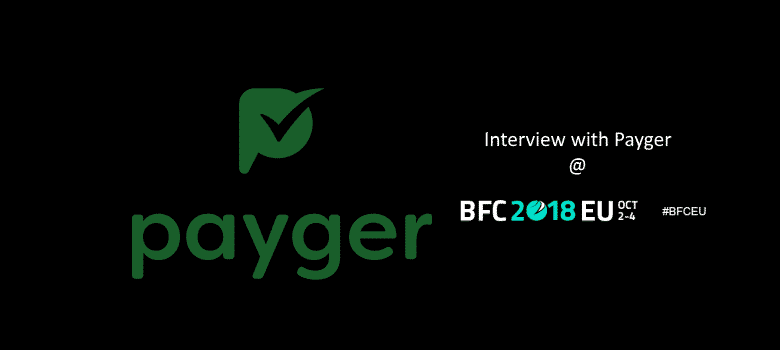I attended this year’s Blockchain For Finance 2018 event in Dublin’s Aviva Stadium, and on the Monday ahead of the conference, Dogpatch Labs hosted a pre-conference pitch session, and Founder and CEO Christoph Hering did a talk to the crowd of about 60 people in attendance on their payments & communication app Payger.
The app combines an e-commerce solution, cryptocurrency wallet and chat app into one, and uses stablecoins on a blockchain. It’s core offering is enabling consumers and businesses to connect peer-to-peer to send money and messages and buy products and services. It’s hooked up to a marketplace that has chat agents to allow people to connect with participating businesses, such as car rental companies. Payger is an open platform, enabling multiple service providers to group together their offerings, for instance a car insurance provider as well.
The wallet supports up to 50 cryptocurrencies and ERC20 tokens, with a focus on stablecoins such as tether which reduce the risk of price volatility. It aims to address some of the common pain points around transacting in general, and with cryptocurrencies, with a 10 minute transaction time, avoid commercial spam on the platform, high fees for using payment gateways and mediocre user interfaces. With the approach of using a stablecoin, it aims to enable companies to get around many issues which lead to poor merchant adoption, while also enabling companies and consumers to track spending and taxes, as well as strong GDPR compliant privacy, as well as private key management.
Their solution is to enable instant crypto payments backed by stablecoins, communciations secured by PGP encryption, and enabling consumers to permanently opt out of commercial messages and control their private data. It also manages the transfer and exchange of multiple cryptocurrencies in non-custodial wallets. With these options, it hopes to connect businesses, consumers and developers within a single marketplace.
The platform itself uses the Bitshares API, which can handle large volumes of transactions per second, and enable same-day settlement in a local stablecoin of choice for the mechant, with automatic conversions of bitcoin and ethereum, as well as bypassing the credit card network with the associated reduction in fraud and chargebacks.
The following day at the conference, we caught up with Christoph at his booth to get a short demo of the (web based) platform. What he showed us was a functional browser based wallet (accessible at wallet.payger.com) and a woocommerce integrated site with some demo items for sale. The first thing I asked was about support for fiat currencies, given that for commerce cryptocurrencies are still a minority, and while there is no support at this time, it is planned to partner with a payment gateway to provide this, as well as to integrate a buy cryptocurrencies option within the wallet.
The app itself allows to deposit, withdraw and transfer up to 50 cryptocurrencies, and enables chat and sending of funds by a payger id, email address or phone number for inter-wallet transfers, as opposed to a long complex private key. The app plans to have an iOS and Android versions, as well as an API to enable developers to build out interfaces, as the platform is modular and has a white label option available.
I asked where Christoph sees the app in its development cycle, and he said they see it in a beta state, with functioning wallet, and an integration with woocommerce already live. Integration with a couple of stablecoins is also available, enabling those who do sign up and use it to get settled via stablecoins. Finally, I asked where the project was funded from so far, and he said that they ran a modest ICO in 2016 under the name Blockpay, and have used the funds to get the platform to the point it’s at.
For merchants or developers interested in signing up to the platform, you can visit https://payger.com



